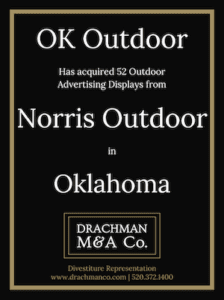
Billboard Insider published in its September 16th edition an interesting article about Lamar Outdoor’s successful inverse condemnation trial against the City of Broken Arrow, Oklahoma. I have several comments about the case.
First and foremost, congratulations to my friends Bill Hickman, Lamar’s attorney, and Paul Wright, Lamar’s testifying appraiser, for a job very well done!
Second, the case demonstrates the difference between a traditional eminent domain or condemnation case, in which the government initiates an action to acquire private property for public use in exchange for just compensation; versus, the inverse condemnation case here, where Lamar had to file the case and seek the compensation for the City’s taking of its property without compensation.
Third, the City effectively took Lamar’s property-the sign and lease-by torturously interfering with the lease and encouraging the lessor to refuse to renew it.
Fourth, normally, these torturous interference and other claims against cities might be barred by sovereign immunity; but, a governmental entity waives its immunity when the plaintiff alleges and offers proof of inverse condemnation, like in this case.
Fifth, the City’s interference was exacerbated by its violations of the Open Meetings Act, when its officials apparently met in “smoke filled rooms” without public participation or notice to hammer out the deal to award the developer the property in exchange for kicking Lamar off of the lease.
Sixth, to make matters worse, the result of the City’s efforts was to confer a private benefit on the developer so it could build a new Collision Center on the property, as opposed to the constitutional requirement of public necessity before private property can be taken under the Fifth Amendment.
Seventh, it looks like the scheme backfired, as the landlord continued to accept rent checks from Lamar after refusing to execute a lease renewal, thereby effectively ratifying the lease anyway and permitting Lamar to remain in possession.
Finally, the damages to Lamar for the taking of the billboard under Oklahoma law would include lost ad revenue under an income approach, as opposed to mere replacement cost less depreciation under a cost approach under the law in Texas and many other jurisdictions.
In short, this was a great victory for Lamar and its team, and it will hopefully be a cautionary lesson for cities and lessors that might try to use such schemes in the future.
To receive a free morning newsletter with each day’s Billboard insider articles email info@billboardinsider.com with the word “Subscribe” in the title. Our newsletter is free and we don’t sell our subscriber list.
Paid Advertisement


















The comment on public entities using eminent domain powers for private development caught my attention.
A variety if legal cases around the country have dealt with this issue where a developer approaches a municipality to condemn an area for a new development.
While not exactly affecting billboards the principal of eminent domain is targeted for public good such as highway expansions. I am sure Mr. Rothfelder can expand on this topic.